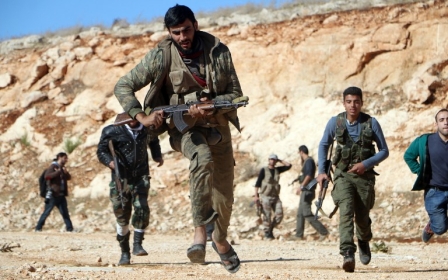Syrian rebels sceptical about chances for ceasefire success

The decision by the US and Russia to pursue a ceasefire in Syria, scheduled to come into effect this weekend, has been greeted with scepticism by many of the groups currently fighting on the ground.
"It's a waste of time and it's difficult to implement on the ground," said Abu Ibrahim, a commander in the 10th Brigade opposition force in the northwestern Latakia province.
He told AFP that he expected "numerous rebel groups" to reject the agreement, which he said was formed "without consulting any factions on the ground".
"The 10th Brigade will commit to the decision of the HNC, but we will respond directly to any shelling by the regime, which has yet to present any goodwill gesture," Abu Ibrahim said.
The agreement does not include the al-Qaeda affiliated al-Nusra Front in the ceasefire deal, one of the problems that fighters and analysts have highlighted as the Syrian government said it will continue operations “against Islamic State, Nusra Front and affiliated terrorist groups".
The Islamic State [IS] group has long been heavily alienated from the opposition with many accusing the group of working tacitly with the Assad government. But as fighting has continued, Nusra has cooperated with many factions within Syria and some analysts say the various groups are too “intermingled” for any effective differentiation.
"The areas where Jabhat al-Nusra holds some sway will likely be the areas most vulnerable to ceasefire violation," said an analysis by the counter-terrorism Soufan Group.
"In some areas, it is impossible to delineate where Jabhat al-Nusra positions end and those of ‘acceptable’ rebels begin."
In addition, “affiliated terrorist groups” could be used to refer to the many groups who have formed joint operations rooms - such as Jaish al-Fatah in Idlib province - with Nusra.
Russia and Syria have also repeatedly grouped the powerful Ahrar al-Sham group - a former leader of which is currently leading the main rebel forces in Aleppo - as “terrorists” in the same breath as Nusra.
The Syrian opposition’s Higher Negotiations Committee (HNC) initially called for a ceasefire to prohibit strikes on Nusra “at least to start with," though the end result of negotiations that broke down earlier this month did not achieve this.
The Furqan brigades, one of the largest groups fighting in the Quneitra governorate near the Golan Heights, released a statement following the ceasefire announcement condemning the exclusion of Nusra from the ceasefire agreement.
“We will not accept the exclusion of Nusra Front from the ceasefire agreement, and we shall remain supportive of the HNC's conditions for accepting the ceasefire providing that they represent the aspirations of our people,” said commander Mohammed Majid al-Khatib.
“Nusra Front is located in various parts of the liberated Syrian territories, and its exclusion from the ceasefire only reflects malice [by the US and Russia].”
Abdurrahman Harkoush, a journalist and former spokesperson for the Jaish al-Islam group in Syria, said that Russia and the Syrian government’s arbitrary definition of “extremist” in Syria meant that the ceasefire was unlikely to hold.
“If there was no ISIS and Nusra, they would kill us because of Ahrar al-Sham, Jaish al-Islam or Faylaq [al-Sham],” he wrote. “They can designate any group as extremist."
A halt in hostilities in Syria would come after five years of brutal civil war that has killed more than 260,000 people and seen half the population displaced, including over four million overseas.
Shortly after the announcement of the ceasefire pact on Monday, Assad announced that parliamentary elections are to be held on 13 April, state news agency SANA reported.
Assad also issued a decree which included seat allocations for each of the provinces in Syria, which last held parliamentary elections in May 2012.
Stay informed with MEE's newsletters
Sign up to get the latest alerts, insights and analysis, starting with Turkey Unpacked
Middle East Eye delivers independent and unrivalled coverage and analysis of the Middle East, North Africa and beyond. To learn more about republishing this content and the associated fees, please fill out this form. More about MEE can be found here.




